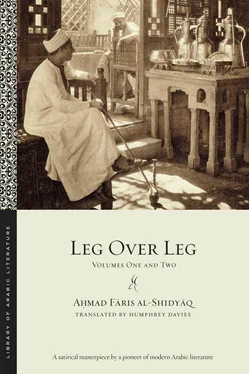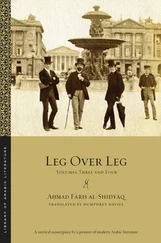Every time, however, he thought carefully about the married state and pictured the troubles and hardships from the devastating heaviness of whose load he’d seen his friends and acquaintances suffer and moan, he’d go back on his decision and laugh at how puerile his mind was and at the weakness of its ability to understand the weakness of his body. Then he’d exuse himself on the basis that anybody who had spent his whole life with opinions opposed to everyone else’s and believing, when in good spirits, sound of body, and in good health, that all of them were in the wrong and he alone in the right, must inevitably quickly change his mind and reject his former way of thinking when afflicted by some bodily weakness. This is what happened to the philosopher Bion 667and many other sages and philosophers. Then the Almighty made amends to the Fāriyāq with His mercy and granted him relief from adversity , and he rose from his bed like one rising from the tomb, went straight to his tambour, and played on it and sang. Leave him now in this state and do nothing to spoil his mood, but gird instead your loins, along with me, and make ready to leap the blazing bonfire that awaits us in Book Three.
*
END OF BOOK TWO
1Buṭrus Yūsuf Ḥawwā: one of a group of Lebanese merchants living in London, on whom al-Shidyāq depended for financial and moral support during his third sojourn there, between June 1853 and the summer of 1857, during which period he was also visiting Paris to oversee the printing of Al-Sāq ; Ḥawwā provided al-Shidyāq with employment as a commercial agent in his offices.
2“that house” ( hādhā l-bayt ): i.e., either the Ḥawwā family or the trading house it owned.
3“the oddities of the language, including its rare words” ( gharāʾibi l-lughah wa-nawādirihā ): works on oddities and rarities of the “classical” or literary Arabic language form a well-established genre of Arabic letters, originally intended to clarify the use of unusual words in the Qurʾān and hadith.
4“morphologically parallel expressions” ( ʿibārāt muraṣṣaʿah , from tarṣīʿ , literally, “studding with gems”): a device used in rhymed prose ( sajʿ ), e.g., ḥattā ʿāda taʿrīḍuka taṣrīḥan wa-ṣāra tamrīḍuka taṣḥīḥan (“until your obscurity reverted to plain statement and your deficient rendering became sound”).
5“substitution and swapping” ( al-qalb wa-l-ibdāl ): on the evidence of his work devoted to the topic, Sirr al-layāl fī l-qalb wa-l-ibdāl , the author includes, under qalb , not only palindromes (the conventional definition of the term; see Julie Scott Meisami and Paul Starkey, Encyclopedia of Arabic Literature , 2 vols. (London and New York: Routledge, 1998), 2:660) but also the substitution of one letter in a word by another without change of meaning (see, e.g., Sirr 46, bāḥah and sāḥah (“open space, plaza”)); by “swapping” the author means variation of the dots used to distinguish certain consonants over an identical or nearly identical ductus to produce different, related, words.
6Unless otherwise noted, definitions added by the translator have been taken, here and throughout the translation, from Muḥammad ibn Yaʿqūb al-Fīrūzābādhī (= Fīrūzābādī), al-Qāmūs al-muḥīṭ , 2nd ed., 4 vols. (Cairo: al-Maṭbaʿah al-Ḥusayniyyah, 1344/1925–26) (see Glossary), from which only one of what are frequently several possibilities has been chosen.
7 Muntahā l-ʿajab fī khaṣāʾiṣ lughat al-ʿArab : this work is also mentioned by the author in his Sirr al-layāl fī l-qalb wa-l-ibdāl (Mattityahu Peled, “Enumerative Style in Al-Sāq ʿalā al-sāq ,” Journal of Arabic Literature , vol. 22, no. 2 (1991), 132); it was multi-volumed and may have been lost in a fire (Mohammed Bakir Alwan, “Aḥmad Fāris ash-Shidyāq and the West” (Ph.D. diss., Indiana University, 1970), app. B).
8i.e. “space for the avoidance of falsity.”
9The author’s implicit claim appears to be that the uncommon “second” or “augmented” form of the quadriliteral verb is associated with intensity.
10Jalāl al-Dīn al-Suyūṭī (d. 911/1505): a prolific polymath, much of whose 500-work oeuvre compiles material taken from earlier scholars.
11 Al-Muzhir fī l-lughah : the full title of the work is Al-Muzhir fī ʿulūm allughah wa-anwāʿihā ( The Luminous [Work] on the Linguistic Sciences and Their Branches ).
12Aḥmad ibn Fāris (d. 395/1004), known as al-Lughawī (“The Linguist”), wrote on most areas of lexicography and grammar. It may be that the author’s choice of the name “Aḥmad” on his conversion to Islam was an act of homage to this scholar.
13i.e., the author does not regard such a straightforward figurative usage as a distinguishing characteristic of Arabic.
14By “the Fāriyāqiyyah” the author has been generally assumed to mean the Fāriyāq’s wife, but Rastegar makes the point that, “while the noun is feminine, it is not simply a feminization of his name (which would be Fāriyāqah). Fāriyāqiyyah should more correctly be translated as ‘Fāriyāq-ness,’ although as a grammatical formulation, it is feminine. Within the text, it is not always clear that it refers to his wife (although at times it clearly does)” (Kamran Rastegar, Literary Modernity between the Middle East and Europe: Textual Transactions in Nineteenth-century Arabic, English, and Persian Literatures , 105–6). The Fāriyāqiyyah does not appear again until Volume Three.
15Rāfāʾīl Kaḥlā of Damascus: a litterateur and collaborator of al-Shidyāq’s in Paris, who paid for the printing of Al-Sāq .
16“the table enumerating synonyms”: i.e., the “Enumeration of Synonymous and Lexically Associated Words in This Book” (in fact, a list of the lists of synonyms, etc.) that occurs near the end of Volume Four and to which the author added further items.
17See 2.3.3.
18“had not been mentioned” ( lam takun shayʾan madhkūran ): cf. Q Insān 76:1.
19“dots that shine”: perhaps refers to the manuscript writers’ tradition of embellishing dots and other diacritical points with colored ink or even gold leaf.
20“with pulicaria / Plants…..” ( bi-l- * rabalāti…. ): Pulicaria undulata ( rabal ) is a plant with medicinal properties that grows in the region; however, rabalāt may also mean “the fleshy thighs of women,” in which case it would prefigure “From them will come to you the scent of statuesque slave girls” three lines further on.
21“statuesque slave girls… plump slave girls” etc.: this list of desirable women is not simply a high-flown metaphor for the joys that the book holds, since the same (mostly rare) words used occur also in the main text.
22“And be not lazy in pursuing and realizing cunsummation” ( wa-lā tatarakhkhā ʾan tudrika l-khurnūfā ): the 1855 edition reads ḥurnūfā , a word not attested in the dictionaries; we have preferred to read khurnūfā (= khurnūfah ) (“vagina”), supposing its usage here to be figurative, i.e., “the desired goal”; it then parallels the phrase used thirty-four lines later fa-tukhṭiʾa l-khur… fah (the ellipsis is the author’s) (“and so miss… summation”).
23Shiẓāẓ: a thief of proverbial skill.
24“I guarantee… hunger” etc.: i.e., the book will distract you from all pleasures and keep you awake at night, but everyone will realize that the book is the cause.
Читать дальше












